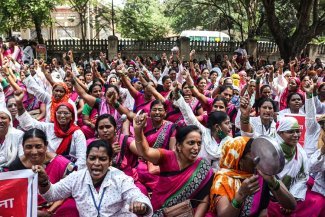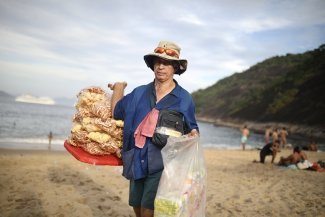With the resurgence of populist nationalism and a rise in the violent rhetoric of intolerance, the freedom of artistic expression is under grave threat. In the Global South and the Global North, in democracies and dictatorships, 2017 saw an alarming deterioration in rights and freedoms according to recent research by Freemuse, a Copenhagen-based international organisation that monitors and documents global attacks on artistic expression, while advocating for a strong legal framework based on human rights to protect the freedom of creatives. In its first annual report, The State of Artistic Freedom 2018, Freemuse warns of the global expansion of a culture of oppression that seeks to silence everyone from dissidents to minorities.
It documented 553 violations of artistic freedom in 78 countries with the combined sentences of 48 imprisoned artists totalling 188 years in prison. On average, every week last year, someone went on trial for exercising their artistic creativity, while thousands of pieces of visual art, music, theatre, dance and literature were censored, vandalised or destroyed. Worse still, the hundreds of cases analysed represent only a small percentage of all violations of artistic expression, as the vast majority go undocumented.
“We only include in the report those we can verify but, in practice, there could be 2,000 cases, or maybe more,” Dr. Srirak Plipat, executive director of Freemuse, tells Equal Times. Thailand-born Plipat has staff in some 30 countries, from Serbia to Pakistan to Nigeria. Despite these assets, he recognises that the report has one main weakness: “There is a language barrier. Countries that we do not speak their languages may be underreported. When you do not report them, they go unnoticed and undocumented.”
Freemuse relies on international law to explain and defend its position on the freedom of artistic expression.
Its main pillar is Article 19 of the Universal Declaration of Human Rights: “Everyone has the right to freedom of opinion and expression; this right includes freedom to hold opinions without interference and to seek, receive and impart information and ideas through any media and regardless of frontiers.”
In addition, the freedom of artistic expression is also ensured by various international treaties, such as the International Covenant on Civil and Political Rights, the International Covenant on Economic, Social and Cultural Rights and by UNESCO’s 2005 Convention for the Protection and Promotion of the Diversity of Cultural Expressions. However, these protections are rarely respected in practice.
“Unlike the Universal Declaration of Human Rights, the two covenants are legally binding, and the states that have ratified them [more than 160 each] have had to adapt their national laws to comply with them,” explains Plipat. However, states face very little censure for non-compliance. “Experts at the UN will review the situation. There will be some naming and shaming, there will be recommendations...that’s how the soft law works. You do not take the government to court.”
A long etcetera
There are various examples of the hundreds of attacks on artistic freedom collected in the Freemuse report. From musicians in Spain sentenced to prison to works of art vetoed in New York museums, an index of 225 films banned in Uzbekistan, blacklists of books in Algeria, and a long etcetera. To avoid the numbers diffusing reality, the investigation delves into qualitative analysis of these cases: by geographical region, the type of violation and the type of artistic genre silenced. Political persecution, censorship, women stripped of the right of expression, silenced minorities and attacks on the lesbian, gay, bisexual, transgender and intersex (LGBTI) community constitute the bulk of the documented violations.
One of the fiercest debates around freedom of LGBTI artistic expression in 2017 took place in South Africa. There, the Film and Publications Board decided to rate Inxeba (The Wound), a film that deals with the taboo of homosexuality in the context of a Xhosa initiation ritual, as pornographic after screening in cinemas as PG16 for two weeks prior. This revision – a form of covert censorship – made it illegal for commercial movie theatres to screen the film and almost condemned it to irrelevance….until international recognition arrived.
Inxeba made its mark at the international film festivals: it shone at Sundance and the Berlinale, won best film at the Taipei Film Festival, and almost secured an Oscar nomination for Best Foreign Language Film. Although part of the backlash against the film was connected to issues surrounding ethnic misrepresentation and cultural appropriation, the majority of attacks had a homophobe strain. “It was stressful and difficult to control the situation,” Inxeba director John Trengove tells Equal Times. “When the movie was released everybody was in a safe place. We did not want people to know where we were.”
Eventually, Inxeba’s right to play in commercial cinemas as a PG16 was reinstated. It was a triumph for the team, but for Trengove it was neither the only nor the most important victory: “The film is transgressive, subversive and challenging. In the process it started a lot of conversations. It went far and did what it was supposed to do, both as a cultural object and as a piece of art.”
Political cartoonists also exist in this controversial intersection between subversion and art. Those working for the Arabic satirical magazine Al-Hudood deal with these tensions from the front lines. Controversies are so common, and the threat of repression is so pervasive, that the magazine’s contributors usually stay anonymous. The vast majority of the cartoons, articles, videos and memes of Al-Hudood appear unsigned to protect their artists, who are spread across 44 countries. The only visible face is that of Isam Uraiqat, Al-Hudood’s editor-in-chief and one of its co-founders.
Uraiqat is a 33-year-old Jordanian, the son of Palestinian refugees, and a staunch supporter of humour as a tool of artistic expression. Although he created Al-Hudood in 2013, along with a group of writers and caricaturists, Uraiqat remained relatively hidden until a year and a half ago. “We did not want to look dodgy, as if is we were hiding something, so we decided to show a bit of a face to be able to talk about what we do,” he says. Last summer, Uraiqat appeared in London to collect the Special Jury Prize at the 2018 One World Media Awards. This gave him a chance to explain the spirit of Al-Hudood and the obstacles the team behind it face.
In a bid to escape the censorship and restrictive laws that prevail in much of the Arab world, Al-Hudood turned to social media. But Facebook’s role as a substitute for the public sphere has proved to be a double-edged sword. Many times, conservative activists and religious extremists have organised online to block Al-Hudood’s content. “We have a massive problem with censorship on social media,” says Uraiqat. “Suddenly, 10,000 people move to report our content on Facebook and we lose access to our page. We contact Facebook to explain what is happening, and they tell us: ‘If the community thinks this is not ok, then it’s not ok,” says the editor.
“They should understand that this is satire, that this is what we are working on, but there is no communication. Every time we get in contact with [Facebook] they tell us: ‘These are the rules, deal with it.’”
The ‘Erdoganization’ of Spain
However, on other occasions, social media platforms serve as a bulwark from which to denounce these attacks on artistic freedom. In Spain – which holds the surprising title of being the country where the largest number of musicians were sentenced to prison in 2017 – several rappers decided to defy the government and publish Los Borbones son unos Ladrones (The Bourbons are thieves), a song to protest the jail sentences of 14 of their comrades. The song title references Iñaki Urdangarín’s – the Spanish king’s brother-in-law – recent conviction for fraud and tax evasion. He was sentenced to five years and 10 months in prison for embezzling about €6 million while exploiting his position in the royal family to obtain public contracts. In addition, his wife Cristina de Borbón (King Felipe of Spain’s sister), was fined €136,950 for benefitting from her husband’s crimes. With this song, which features verses by Pablo Hasél, Valtonyc and the collective La Insurgencia – who have all been sentenced to prison sentences by Spanish courts – new rappers incriminate themselves in an attempt to raise an alarm about the (mis)use of anti-terrorist laws to send artists to prison.
“The video clip is a challenge because part of the lyrics we use have been deemed criminal by the Constitutional Court, the highest in this country,” explains César Strawberry, vocalist with the rap-rock outfit Def Con Dos and one of the artists involved in the video. In 2017, Strawberry was also sentenced to one year in prison in addition to a six year-six month disqualification from public office for “glorifying terrorism” and the “humiliation [of its] victims”. In his case, however, it was not his songs the court considered a crime, but his comments on Twitter.
In Spain, a country “weak in rights and freedoms,” according to Strawberry, there is a paradoxical situation: since the Basque separatist group ETA announced a “definitive cessation of its armed activity” in 2011, sentences of glorification of terrorism have grown four-fold, especially since the conservative government of Mariano Rajoy’s People’s Party achieved a parliamentary majority in 2015.
“This generates a wave of fear that leads to self-censorship. It makes people afraid to express themselves,” says the musician. “We no longer have to wait for a police officer to shut us up – we do it [ourselves] for prevention, because we fear for our own safety…it is an ‘Erdoganization’ of Spain.”
On 1 June 2018, a vote of no-confidence ousted Rajoy’s government. Three months later, the National Criminal and Administrative Court (Audiencia Nacional), lowered the sentences of Pablo Hasél and the 12 condemned members of La Insurgencia to non-custodial sentences. In Belgium, where the rapper Valtònyc fled to after being sentenced to prison, a court in the Flemish city of Ghent ruled that the rapper should not be extradited to Spain.
Although Freemuse’s report makes for depressing reading, the artists interviewed for this article are still hopeful about the future. Strawberry maintains that the jurisprudence that is being dictated in Spain has no place within the framework of the European Union and that all sentences will be revoked once they reach the European Court of Human Rights. “It is hard for people to understand that freedom of expression is a right for all; we have to be able to consent to what we do not like.” For Uraiqat, the editor of Al-Hudood, “things are getting better and worse in the Arab region: women are driving in Saudi Arabia, but the war in Yemen has never been worse. Things, however, are moving, that’s probably a good thing. People think that [they can] do something. They have a little bit more hope.” Despite censorship and threats, film director John Trengove also sees cause for optimism: Inxeba was not the only African film focusing on Africa’s LGBTI community last year.
Rafiki, an acclaimed Kenyan film that explores a forbidden romance between two young women in Nairobi (and which also faced a wave of censorship and backlash) went from Kenya to Cannes. “Despite the adversities, there is a dialogue starting. People are starting to engage in it,” he says.









